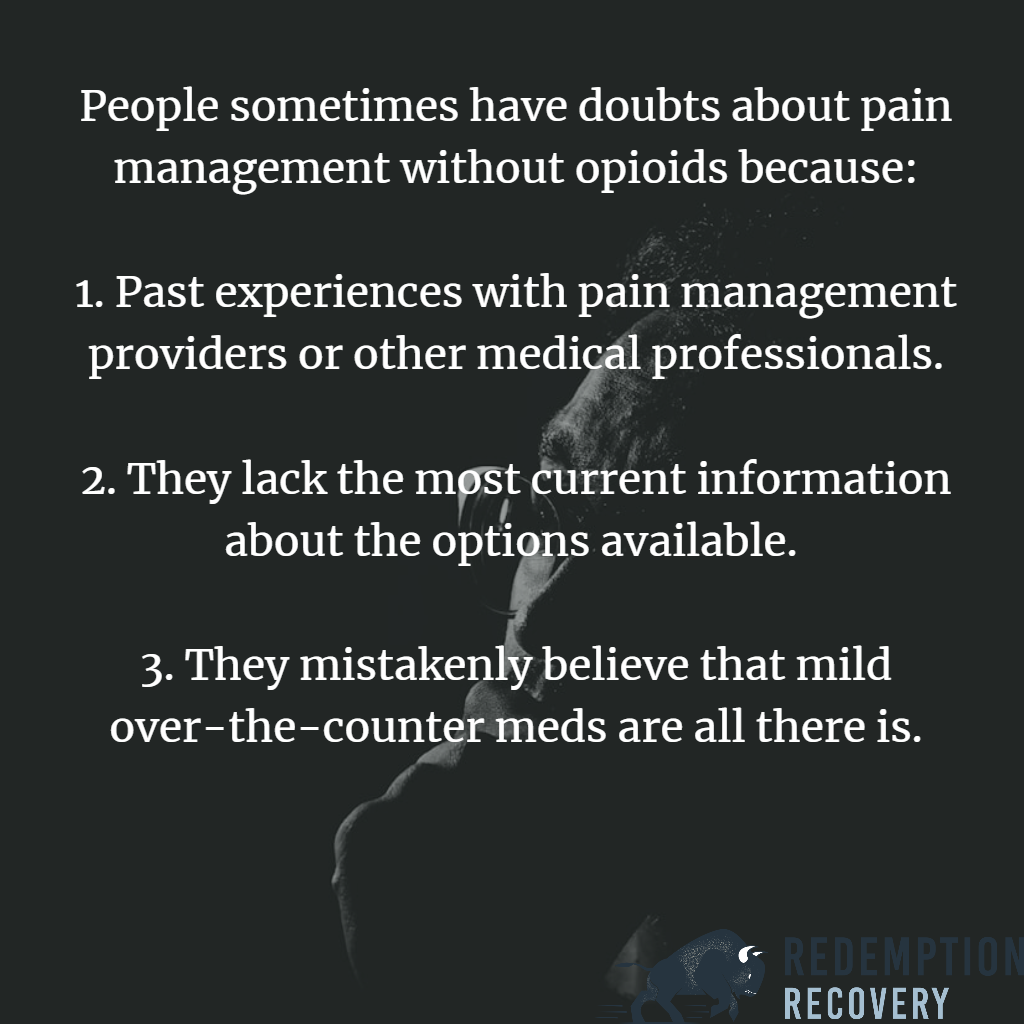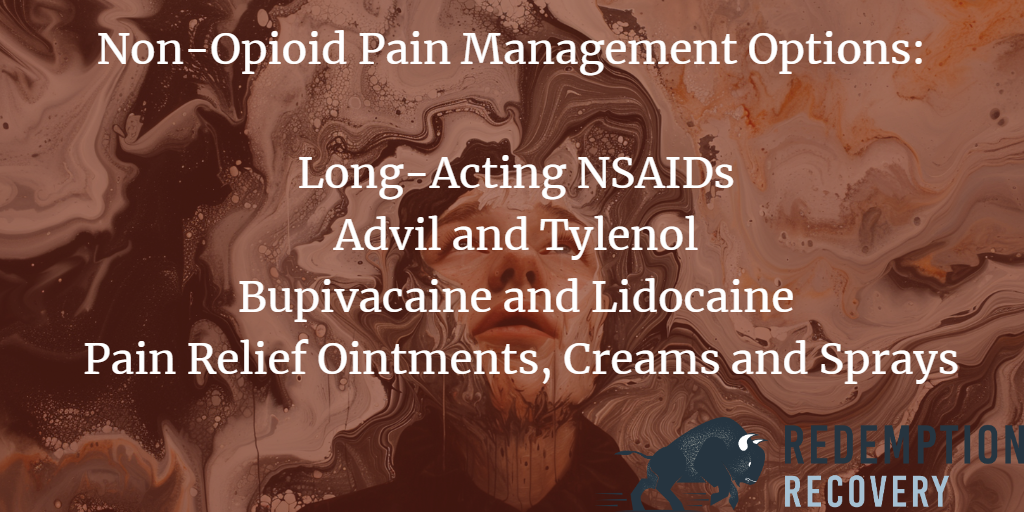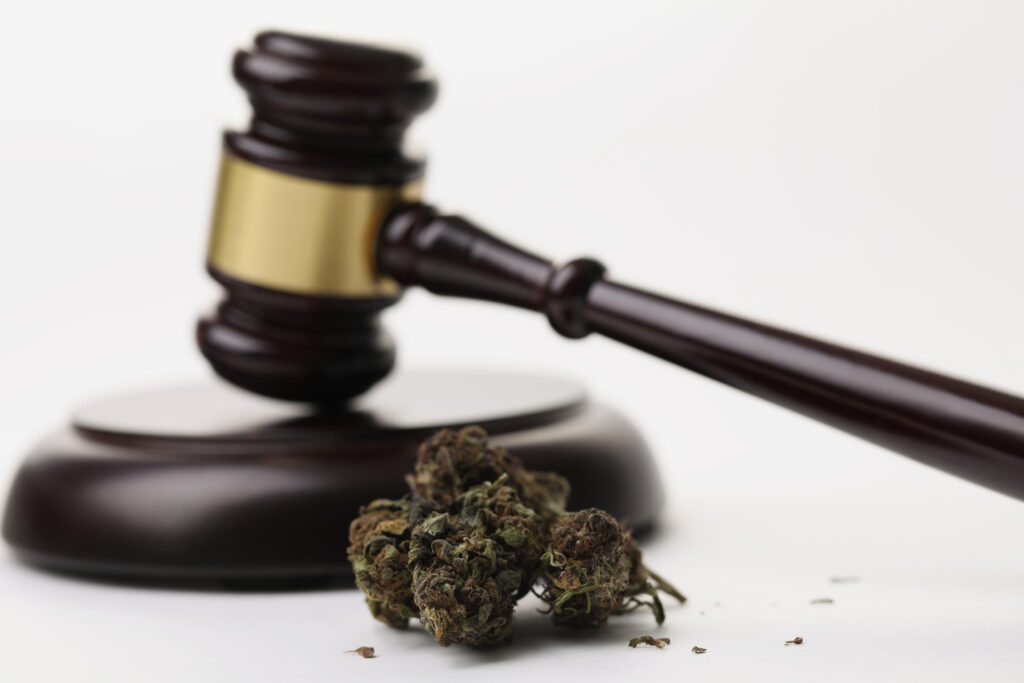For people living with chronic pain from a back or other injury, surgical complications, or illnesses like degenerative disc disease — pain management is often a part of life. But pain management also often entails medications that cause dependence and often lead to opioid addiction.
This article takes a look at the challenge of managing pain while avoiding opioid addiction and explores some of the safer, non-narcotic alternatives.
Doubts About Pain Management Without Opioids

Some skepticism about non-addictive pain management solutions is only natural. Most pain management patients have been through the wringer. It’s not just the pain they live with. It’s also doctors and nurses who seem to underestimate their pain, appeal less than empathetic, or even accuse them of drug-seeking behavior.
Living with chronic pain is hard enough without dealing with people who are skeptical about your actual level of suffering or who suggest you take an Advil or aspirin and just “tough it out”. That’s easy for someone else to say when they aren’t experiencing the pain themselves. We get it. We aren’t here to try and convince you of anything that isn’t true.
People sometimes have doubts about pain management without opioids because:
- Past experiences with pain management providers or other medical professionals.
- They lack the most current information about the options available.
- They mistakenly believe that mild over-the-counter meds are all there is.
Does Non-Narcotic Pain Management Without Opioids Work?
Truthfully, YES. Now, that does not mean that absolutely every pain management patient will be best served by a non-narcotic pain management solution. But, the reality is there is a huge demand for more effective pain management in the U.S. that doesn’t rely on narcotic meds. That demand has been met with an unprecedented amount of research over the past two decades. Addiction is more widespread than most people realize, even right here in Ohio.
Chances are that whatever you think you know about non-narcotic pain management is out-of-date by now and may be largely inaccurate. The truth is that great advances have been made in recent years. Millions of Americans with chronic pain are benefiting from pain management without opioids already. They’ve either recovered from dependence and addiction to pain meds — or they’ve managed to avoid the pitfalls in the first place by choosing non-narcotic pain management from the beginning.
Should I Avoid Opioid Pain Management if I’m Not Addicted?
This is a great question. After all, lots of people on pain management programs that include narcotic medications like hydrocodone or oxycodone take their medications exactly as prescribed. The trouble is that opioid pain medications were never really intended for long-term use under ideal conditions. The risk of both dependence and addiction makes regular opioid use for more than a couple of weeks dangerous. Even for a person with no history of addiction. Even if somebody never misuses a drug even once, they are at risk.
Even If You Aren’t Addicted to Pain Meds — You Are Likely Dependent
Most people use the words addiction and dependence interchangeably, but they don’t mean the same thing exactly. Dependence is entirely physical. Anyone who takes opioids daily (or almost every day) for more than a month or so will become physically dependent. All this means is your body has adapted to the presence of the drug and if you stop taking it, you will have physical withdrawal symptoms.
Dependence on Painkillers vs Addiction to Painkillers
You can be dependent without being addicted. Addiction is a form of dependence, except it’s mental. Addiction to painkillers is a psychological reliance on opioids to function and feel “OK”. It may begin innocently, when someone takes just a little extra to get through a tough time or it may happen when someone is sad or angry and wants to change their mood. However it begins, once you’re addicted, the drug slowly, but certainly, becomes the most important thing to you.
Pain management without opioids is often the better choice when possible, because:
- Physical dependence on painkillers is inevitable. If you take opioids every day for more than a month or so, you will develop physical dependence and you will get sick if you suddenly stop taking them.
- Addiction to painkillers, also known as psychological dependence, is a very real threat for pain management patients – even if they have no history of addiction, family history, or genetic predisposition. Addiction can happen to anyone.
Options For Pain Management Without Opioids

The list of tools to control chronic pain without addiction is growing every year. The research and development of non-addictive painkillers is being driven by both America’s opioid crisis and the aging population.
Here are just a few examples of effective, non-narcotic pain management solutions:
Long-Acting NSAIDs
Non-Sterioidal Anti-Inflammatory Drugs or NSAIDs are a critical pain-fighting tool, since inflammation is often a factor in pain, even when people aren’t aware. A new class of longer-acting NSAIDs, like Aleve (naproxen sodium) work well for chronic pain because they last for 12 hours or more.
Advil and Tylenol
Hear us out — we’re not talking about just taking one or the other. Several recent studies found that Advil (ibuprofen) and Tylenol (acetaminophen) used in combination are extremely effective at managing pain. In fact, they are being sold combined in one tablet as the prescription drug Maxigesic and over-the-counter products like Advil Dual-Action.
Bupivacaine and Lidocaine
Local anesthetics, like bupivacaine and lidocaine affect the location where the pain originates. That’s why they deliver more pain relief faster than anything else. What’s even better is, they are non-narcotic addictive with no threat of addiction or withdrawal. Lidocaine is even available at non-prescription strength in topical ointments, sprays, or patches.
Pain Relief Ointments, Creams and Sprays
Painkillers that are applied to the skin, like ointments, creams, and sprays are also known as topical pain relievers. They work like local anesthetics and like local anesthetics, they go right where the pain is and start working FAST. Diclofenac is one topical NSAID you might look for. Another is capsaicin, which comes from spicy peppers. Capsaicin is available over the counter in products like Salon Pas patches.
Sober Pain Management is Possible — We Can Help
Chronic pain doesn’t need to lead to dependence or addiction. If you or someone you love is struggling with reliance on narcotic pain medication and pain management or any other type of addiction, Redemption Recovery is ready to help.
We offer a range of treatment options from partial hospitalization programs (PHP) to intensive outpatient programs (IOP) and outpatient programs in Ohio. All it takes is a phone call to (419) 528-8007 to start moving toward freedom and a drug-free life.





